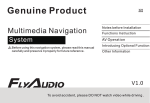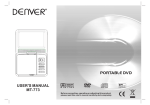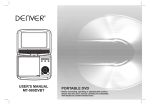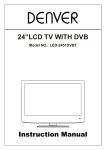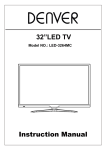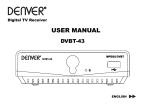Download Denver MCU-5210
Transcript
MCU-5210 (English) (A4) r • 24 Dec 2011 • AT ENGLISH 24 CD PLAYER WITH FM STEREO ALARM CLOCK RADIO MODEL MCU-5210 The lighting flash with arrowhead symbol, with an equilateral triangle is intented to alert the user of the presence of uninsulated dangerous voltage within the product's enclosure that may be of sufficient magnitude to constitute a risk of electric shock to persons. BEFORE OPERATING THIS PRODUCT, READ, UNDERSTAND, AND FOLLOW THESE INSTRUCTIONS. Be sure to save this booklet for future reference. 25 26 11 12 8 9 10 CAUTION 1 RISK OF ELECTRIC SHOCK DO NOT OPEN 3 13 15 5 16 7 19 20 CAUTION: TO REDUCE THE RISK OF ELECTRIC SHOCK, DO NOT REMOVE COVER (OR BACK). NO USER SERVICEABLE PARTS INSIDE. REFER SERVICING TO QUALIFIED SERVICE PERSONNEL. 2 4 The exclamation point within an equilateral triangle is intended to alert the user of presence of important operating and maintenance (servicing) instructions in the literature accompanying the appliance. 6 14 17 18 23 21 22 1. Stop Button 2. Fast Rewind (REW ) Button 3. CD/SD/USB Button 4. Folder Up Button 5. Repeat/Random Button 6. Play/Pause Button 7. Fast Forward (F.F ) Button 8. Battery Compartment 1 6 2 3 4 5 7 8 Insert two(2) "AAA"/1.5V batteries following the polarity as indicated in the compartment to the right. Alkaline batteries are recommended for long using time. Note: when planning not to use the remote control for a long time. Remove the batteries in order to avoid the electrolyte leakage. Unit power supply( mains 230V~50Hz) Connect the power cable plug to the (230V) wall outlet. WARNING: TO REDUCE THE RISK OF FIRE OR ELECTRIC SHOCK, DO NOT EXPOSE THE APPLIANCE TO RAIN OR MOISTURE. Under the influence of electrostatic phenomenon, the product may malfunction and require user to power reset. 20-TRACK PROGRAMMABLE CD PLAYER LCD CLOCK FM STEREO RADIO ALARM FUNCTION-WAKE TO RADIO, CD PLAYER OR BUZZER AC POWER SUPPLY WITH CLOCK BATTERY BACKUP STEREO HEADPHONE JACK USB-PORT / MMC / SD SLOT REMOTE CONTROL LOCATION OF CONTROLS 27 1. 2. 3. 4. 5. 6. 7. 8. 9. 10. 11. 12. 13. 14. 15. 16. 17. 18. 19. 20. 21. 22. 23. 24. 25. 26. 27. Play/ Pause Button Fast Forward (F.F ) Button Fast Rewind (REW ) Button Stop Button Repeat Button Random Button Program Button FM STEREO Indicator LCD Display Standby/Power ON Button Minute Button Time Set Button Hour Button Alarm Set Button Alarm ON/OFF Button Volume + Button CD Door Open/Close Button IR Volume - Button AUX In Phone Jack SD slot USB slot Tuning Button FM Button Buzz/CD/Radio/Aux Button Speakers 27 Warning: Before using the unit. Check that the local mains supply is compatible with the HI-FI System (230V~50Hz). Do not plug or unplug the power cable when your hands wet. When planning not to use this unit for long period of time (i.e, Vacation etc.) disconnect the plug from the wall outlet. When disconnecting the power cord from the wall outlet, grasp the plug; do not pull the cord in order to avoid shock risks caused by the damaged cable. BATTERY SAFETY PRECAUTIONS: • Keep batteries away from children and pets. • Insert the battery observing the proper polarity (+/–). Failure to properly align the battery polarity can cause personal injury and/or property damage. • Remove spent or discharged batteries from the product. Remove the battery when the product will not be used for extended periods of time to prevent damage due to rusted or corroded batteries • Never throw batteries into a fire, Do not expose batteries to fire or other heat sources • Battery Disposal: Spent or discharged batteries must be properly disposed of and recycled in compliance with all applicable laws. For detailed information, contact your local country solid waste authority. • Follow the battery manufacturer’s safety, usage, and disposal instructions. BATTERY BACKUP: Two 1.5V “AA” batteries (not included) may be installed as a backup option to maintain the time if electrical power fails. In the event of a power outage, the time will not appear on the clock LCD Display, however the clock will continue to operate and the actual time will be maintained. The Clock LCD Display and other functions will resume once electrical power is restored if used the backup battery .The backup battery should be replaced as needed; Remove the battery if the clock is not used or stored for long periods of time. MCU-5210 (English) (A4) r • 24 Dec 2011 • AT CLOCK SETTING Press and hold “TIME” button to set the clock, press HOUR button or MIN button respectively to adjust the display time. TO SET ALARM FUNCTION 1. Power off the unit and enter into “POWER OFF” mode. While pressing and holding the AL.SET BUTTON, press the HOUR BUTTON to set desired alarm hour. 2. While pressing and holding the AL.SET BUTTON, press the MIN BUTTON to set desired alarm minute. 3. After setting the alarm time as your desired, remember to press AL.ON/OFF button to turn on the alarm function. (alarm sign “ ” will show on LCD display) TO WAKE UP TO ALARM BUZZER: a. Slide the Function switch (BUZZ/CD/RADIO/AUX) to BUZZ position b. The alarm buzzer will sound for 3 minutes at the set alarm time. Note: Press ALARM ON/OFF button to turn off the alarm when it sounds. TO WAKE UP TO CD: a. Slide the Function Switch (BUZZ/CD/RADIO/AUX) to CD position b. Open the CD Door and insert a CD (with the label side facing up) into the CD compartment. c. Close the CD Door. d. The CD will sound at the set alarm time playing the first track on the CD. Note: The unit will automatically be turned off after 1 hour. To deactivate the alarm (CD playing) manually, press the STOP Button. • Handle a disc only by its edges, Do not touch the surface or rainbow-colored side of the disc • Handle a disc as shown in the illustrations in this section • Use a soft cloth to wipe a disc clean. Do not use benzene, thinner, or other chemical cleaners to clean the disc as damage may result. A disc should always be wiped in a straight line from its center to its edge. Never wipe a disc in a circular motion. • Do not expose a disc to direct sunlight, high humidity, or high temperatures for extended periods of time. Do not place the Disc on other equipment or near any heat source. • Dust on the pickup lens can lead to erratic operation and interruption of the sound during play. To clean the pickup lens, open the disc compartment and blow the dust off . Using a camera lens blower(available at most camera stores) • Note: Do not touch the surface of the lens. Do not allow any liquids on the inside of the product. • To clean the CD player cabinet, use a soft and damp cloth to wire off the exterior surface. • Never use benzol, benzene, or other strong chemical cleaners, as these could damage the finish. DO: DO NOT: PLAYING A COMPACT DISC (CD / MP3) NOTE: Never touch the laser lens inside of the CD compartment. Clean the laser lens with a CD cleaner disc if it becomes dirty. 1. Slide the Function Switch (BUZZ/CD/ALARM/RADIO) to CD position. 2. Open the CD DOOR and insert a CD into the tray with printed label side facing up. 3. Close the CD DOOR and Press the Power ON/OFF Button to turn TO WAKE UP TO RADIO: on the unit, the disc will rotate for a few seconds and then stop. a. Slide the Function Switch (BUZZ/CD/RADIO/AUX) to 4. Use the REW & F.FWD button to choose a track RADIO position 5. Press the PLAY/PAUSE BUTTON to start play b. Slide the Band Switch (FM ST. / FM MO) to FM or FM stereo 6. Press the PLAY/PAUSE BUTTON again to PAUSE play. position. 7. To stop the album temporarily, press PAUSE button, to resume, c. Press POWER ON/OFF BUTTON to turn on the unit first. press again. d. Tune the radio to a broadcasting station and adjust the volume 8. Press the STOP BUTTON to STOP play. as desired. e. Then press the POWER ON/OFF BUTTON again to turn off RANDOM PLAY the unit. • In CD play mode, Press the REPEAT BUTTON three times, f. The radio will sound at the set alarm time. “RAND” will appear on LCD Display. Note: The unit will automatically be turned off after 1 hour. • In MP3 play mode, Press the REPEAT BUTTON four times. To deactivate the alarm (Radio sound) manually, press the “RAND” will appear on the LCD Display. POWER ON/OFF BUTTON. • To cancel RANDOM PLAY, press the REPEAT BUTTON repeatedly until the “RAND” sign disappeared. HOW TO TURN OFF THE ALARM To cancel alarm mode: REVERSE/FORWARD In “POWER OFF” mode, press ALARM ON/OFF button to turn 1. The CD Reverse (REW ) and CD Forward (F.FWD ) Buttons off the alarm function. (alarm sign “ ” will disappear on the can be used to jump to a different track number or to scan disc LCD Display). tracks at high speed. 2. Press the CD Reverse Skip Button (SKIP ) once to hear the ADJUST VOLUME beginning of the current track. Press it two or more times to hear • Press VOL.+ button to increase the volume. previous tracks on the disc. • Press VOL. – button to decrease the volume. 3. Press the CD Forward Skip Button (F.FWD ) to hear the next track on the disc. RADIO OPERATION 4. Press and hold the CD Reverse Search (REW ) Button, the 1. Select the Function Switch (BUZZ/ CD/ ALARM/ AUX) to current track will be scanned and move backwards to the previous RADIO position. track(s); When the desired track section is found, release the button 2. Select the Band Switch (FM ST / FM MO) to desired band. and normal play will resume. 3. Press the POWER ON/OFF BUTTON to switch Power on. 5. Press and hold the CD Forward Search (F.FWD ) Button, the 4. Rotate the Tuning Control Knob to the desired radio station current track will be scanned and move forward to the next track Note: The STEREO Indicator will light when a program is (s); When the desired track section is found, release the selected received in FM Stereo. If the FM reception is noisy, switch the button and normal play will resume. band selector to the FM MO position and the program will be received in Mono radio. REPEAT FUNCTION 5. Press the Volume Control Knob to a comfortable listening The CD REPEAT may be used to repeat a single track or repeat all level. tracks on a compact disc. 6. To switch off the radio, Press the Power ON/OFF Button 1. In CD mode, Press the REPEAT BUTTON once during playback, once. the “REP” sign will show on LCD Display. The same track will be repeated over and over. HANDING A COMPACT DISC 2. Press the REPEAT BUTTON a second time to repeat all tracks. • Always protect a disc against scratches, soil , dust and etc. If a The “REP ALL” sign will show on the LCD display, but will not disc is treated with reasonable care, wiping off the disc with a flash this time. soft cloth should be the only maintenance needed to retain its 3. To cancel REPEAT PLAY, Press the REPEAT BUTTON repeatedly excellent sound reproduction. Discs should be retained in their until the “REP” sign disappeared. original case during periods of non-use. The MP3 REPEAT may be used to repeat a single track, an album or TROUBLESHOOTING GUIDE repeat all tracks on a MP3 Disc. You experience a problem with this unit check the chart 1. In MP3 mode, Press the REPEAT BUTTON once during playback, below before calling of service. the “REP” sign will show on the LCD Display. The same track will be repeated over and over. 2. Press the REPEAT BUTTON a second time to repeat a selected SYMPTOM CAUSE SOLUTION album/folder, the “REP ALB” sign will show on the LCD display. CD Player will • AC Cord not connected • Connect the AC cord 3. Press the REPEAT BUTTON a third time to repeat all tracks. The Not turn on properly. properly. “REP ALL” sign will show on the LCD Display 4. To cancel REPEAT PLAY, Press the REPEAT BUTTON repeatedly • Reinsert disc with label • Disc inserted until the “REP” sign disappeared. side facing up. incorrectly. PROGRAM FUNCTION The Program feature can be used to program up to 20 tracks to play in a selected order. 1. While in the stop mode only (CD is not playing), press the CD PROGRAM “PROG” Button, LCD Display will show the wording “PROG 01” and “PROG 01” starts to flash. 2. Press the CD Reverse (REW ) /Forward Buttons (F.FWD ) to allocate the desired track. 3. Press the CD PROGRAM BUTTON to select and store the track into memory. 4. Repeat step 2 to 3 to select up to 20 tracks. 5. To play the selected tracks (in the program mode), press the CD PLAY/PAUSE BUTTON. The track number and the “PROG” appear on LCD Display. 6. Press the CD Reverse (REW ) to hear the previous or press the CD Forward (F.FWD ) buttons to hear next program track. Note: After all of the programmed tracks have played, the CD player will return to the stop mode. 7. To clear the programmed tracks from memory, press STOP two times. • Defective compact disc. Disc will not • CD compartment not Play closed. • Moisture condensation on disc. Erratic CD • Dirty or defective disc. playback No sound Noise or Sound • Try another compact disc. • Close CD compartment. • Wipe disc with soft cloth. • Clean or replace disc. • Headphone + Speaker plug are not inserted properly. • Volume control set to minimum. • Defective compact disc. • FUNCTION is not set to the desired position. • Reinsert headphone or Speaker Plug into headphone or speaker jack. • Increase the volume. • Try another compact disc. • Press FUNCTION SELECTOR switch to the desired function. • Unit is not positioned • Rotate unit until best UNIVERSAL SERIAL BUS PORT FUNCTION (USB) to listen MP3 correctly. reception is obtained. distorted on 1. Press FUNCTION button select to CD. radio 2. Connect USB disk into the USB slot of the system. 3. Press the CD/SD/USB Button to select the USB mode. 4. The “USB” sign will show on the LCD display. If there is no USB COPYRIGHT DENVER ELECTRONICS A/S plug in, “NO” will be shown on the display. And the total number of tracks will be indicated on the display. Adjust the volume as desired. DENVER 5. Press PLAY/PAUSE to start playing. www.denver-electronics.com 6. Press the PLAY/PAUSE again to stop playing temporarily. Resume normal play by pressing the PLAY/PAUSE button again. 7. To stop playback, press the STOP button .The total number of tracks Electric and electronic equipment and included batteries contains will be shown on the display. materials, components and substances that can be hazardous to Remarks: All the function operations of USB disk are same as your health and the environment, if the waste material (discarded playing MP3disc. electric and electronic equipment and batteries) is not handled Secure Digital Card (SD) to listen MP3 correctly. 1. Press FUNCTION button select to CD. 2. Connect SD card into the SD slot of the system. 3. Press the CD/SD/USB Button to select the SD mode. 4. The “card” sign will show on the LCD display. If there is no SD plug in, “NO” will be shown on the display. And the total number of tracks will be indicated on the display. Adjust the volume as desired. 5. Press PLAY/PAUSE to start playing. 6. Press the PLAY/PAUSE again to stop playing temporarily. Resume normal play by pressing the PLAY/PAUSE button again. 7. To stop playback, press the STOP button .The total number of tracks will be shown on the display. HEADPHONE JACK This unit will accept stereo headphones with a Ø 3.5mm plug. Before connecting the headphones set the volume to minimum level as not to damage your ears or the headphones. Connect the headphones to the headphones jack. The speakers will be automatically disconnected. Warning: Prolonged exposure to high sound levels may permanently damage your hearing. You may not hear some warning sound while wearing these headphones. AUX INPUT JACK 1. Adjust the POWER OFF/ AUX/ RADIO/ CD selector to AUX. 2. Connect the AUX connect wire from the out jack of your Personal Player such as portable MP3 player to the AUX input jack. 3. Play Start from your Personal Player. Electric and electronic equipment and batteries is marked with the crossed out trash can symbol, seen below. This symbol signifies that electric and electronic equipment and batteries should not be disposed of with other household waste, but should be disposed of separately. As the end user it is important that you submit your used batteries to the approriate and designated facility. In this manner you make sure that the batteries are recycled in accordance with legislature and will not harm the environment. All cities have established collection points, where electric and electronic equipment and batteries can either be submitted free of charge at recycling stations and other collection sites, or be collected from the households. Additional information is available at the technical department of your city.


